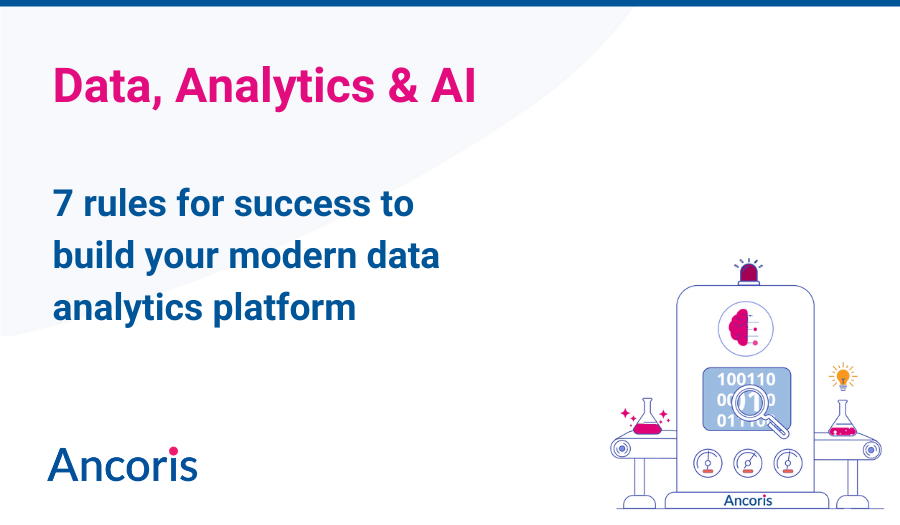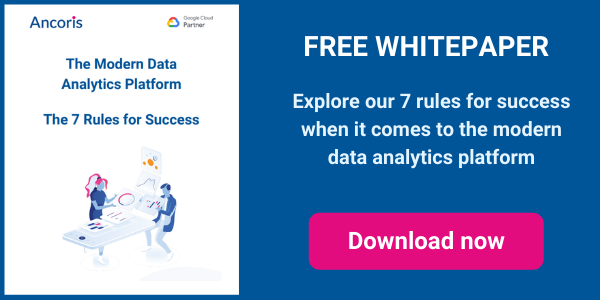You already know your organisation needs to become more data-driven: using the data you already collect to make better decisions, operate more efficiently, and improve customer experiences and engagement.
Yet you’re all too aware that far too many data initiatives — possibly even some of your own projects — have failed to deliver the promised value. They’ve cost too much, taken too long to implement and haven’t provided timely, actionable insights to the right decision makers. Even successful projects often have been difficult to deliver, demanding scarce expertise and a deep understanding of the issues and pitfalls that puts them out of reach for most IT teams.
Now cloud computing is changing the rules, with a new data analytics paradigm. Secure, robust, hyper-scalable cloud platforms and tools allow solutions to be deployed in weeks, not months, and put advanced data science technologies within reach for every organisation.
Even so, building a successful modern data analytics platform is still not easy. Based on our work with our own customers here at Ancoris, using tools from Google and its partners, we've identified seven rules for success:
- Deploy a best-in-class data platform. Google BigQuery is a modern hyper-scale Cloud data warehouse platform that we think perfectly balances scalability, flexibility, cost of ownership and ease of use, whilst guaranteeing security.
- Implement flexible, reliable data ingestion. Google Cloud offers a variety of code and no-code options that, together with third-party solutions such as Fivetran, will ensure your data ingestion platform can handle whatever new types of data the future throws at you, at any volume and any speed.
- Simplify the creation of robust data transformation pipelines. To deliver high-value insights requires running data cleansing, consolidation, and transformation routines on the raw data you’ve ingested. With Google’s Google modern data analytics platform, you can run these transformations directly in BigQuery, exploiting its enormous compute capabilities and with no need to stage data to another system. Third-party tools like dbt allow anyone familiar with SQL to quickly build, automate, schedule and manage robust data pipelines.
- Organise data assets for easy consumption. Good organisation not only lets you present data to users in a way that supports your organisation’s needs but also helps you to create and maintain stringent governance and privacy controls and implement effective security. Google Cloud’s solutions make it easy to take a multi-layered approach that separates and optimises each step in the chain from raw data to valuable data assets.
- Exploit accessible machine learning and AI. Google’s BigQuery ML and Cloud AutoML allow teams with limited machine learning expertise to easily train high quality machine learning models, using either SQL or easy-to-use graphical interfaces.
- Deliver timely, engaging, action-orientated insights to key decision-makers. Data Studio and Looker, both part of Google Cloud, let you build dashboards and custom visualisation that are highly scalable and responsive — no matter how much data is feeding them — empowering your decision makers to explore their own data and surface insights by themselves.
- Identify a clear path for delivering value. Creating a data-driven culture within your organisation and reaping the benefits of your investment rests on engaging your employees so they’ll use the tools you’ve provided and trust the insights they’re given. While you might have long-term objectives for your data strategy, you need to begin with identifying and delivering a quick proof of concept project with a high-value impact on the business. That will allow you to you create early buy-in from influential decision makers, demonstrate tangible value to other stakeholders, and prove the technology is viable in terms of security, performance, ease of use and governance.
Take the example of our customer Causeway Technologies. A provider of cloud solutions to the construction industry, it wanted to help its customers make better use of the data stored in its SaaS systems to run their business operations more effectively. The company began its move towards creating a modern data analytics platform by identifying a project involving an internal dataset that would both meet an immediate business need and provide a proof of concept for the company’s long-term data strategy.
Working with Ancoris, Causeway created a single trusted source of cleansed and transformed data, held in BigQuery, that drives interactive dashboards built in Google Data Studio for both product managers and customer-facing teams. The whole project took just a few weeks and provided the business with insights it was crying out for, while establishing a robust technical platform and methodology that can be applied to other data sets and user groups. Causeway is now working with Ancoris on a project involving client data, which is also giving Causeway a chance to evaluate Google’s machine learning tools.
To read more about how to apply these rules in your own organisation and to explore other examples of how our team of experienced data scientists, mathematicians and engineers have helped numerous companies like yours to use Google Cloud to implement successful modern data analytics platforms, read our white paper — simply click on this download link.


